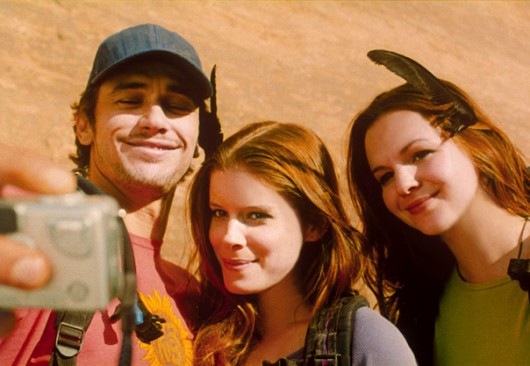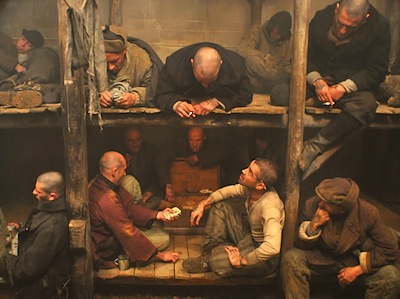BLACK SWAN (2010) - 5 STARS
"I had the craziest dream last night"
The art of ballet has never been my strong point with cultural entertainment but it certainly does transcend well to the screen with Darren Aronofsky's psychological thriller Black Swan which not only mystifies those who watch it, but even leave us terrified of hurting our own skin when it comes to the way it's shown before us. Having made a clinical yet bleak film a couple of years back with The Wrestler (2008), Aronofsky presents us with an enthralling thrill-ride which fully deserved award success recently, with the film lead by a raw, energetic performance by Natalie Portman who is supported well by her co-stars, and superbly shocking us with what her character goes through, and all in the name of art. The art itself is truly worthy and even with the sight of Swan Lake playing throughout the story, it doesn't have any chance of overshadowing the dark, surreal nature of the film's vision....a haunting experience.
Nina Sayers (Natalie Portman) has made it her lifelong ambition to reach the top of the ballet world, training hard to gain her dream of becoming a ballerina. Her optimistic mother Erica (Barbara Hershey) believes her daughter is surely capable of being picked for the upcoming ballet season, and that gives Nina the confidence that this could be her chance at last. At the New York Ballet School, her sleazy tutor Leroy (Vincent Cassel) reveals that the production she and her fellow ballerinas will be working on is Tchaikovsky's Swan Lake, for which the twist of the play is that one ballerina will play both the White Swan and the Black Swan. Nina tries to prove to Leroy that she is capable of taking on both roles but he fears that she is too vulnerable and frigid to play the Black Swan leaving her feeling dejected. However his sexual persistence allows her to react to it reluctantly and he gives her the role knowing she is able to release herself more. While Nina is ecstatic about getting the role, she soon realises that things are starting to happen to her that are possibly occurring because of the ambition to perform well. This is proven by hallucinating about her skin where cuts and marks start appearing causing concern from her mother but Nina knows that she wants to work hard to impress both her mum and Leroy. Things are then further complicated by the involvement of another young attractive ballerina named Lily (Mila Kunis) who starts triggering paranoiac nerves from Nina who fears that Lily is trying to take the role from her. This whole psychological presence threatens to take over Nina and the film's journey places her in dark places for which she must try and stop otherwise it could destroy her....
Aronofsky has certainly continued his artistic catalogue of films which started with Requiem For A Dream (2000) and yet again has made another riveting, modern masterpiece. He captures everything beautifully in frame, his movement of the camera is almost as fluent and beautiful as the very dancers on the screen. And his use of lighting is nothing short of extraordinary adding to the innocent colour used when Nina is in her normal world and dark lighting when going through her crazy mind with what she thinks she sees. Though I stated before about this film being completely different to his previous film The Wrestler, the lead roles share in common that the main character become dedicated to an unappreciated form of physical art that ultimately destroys them both. The final line in the film for those who watch it, sums it up with a narrative that shocks but amazes us with its dark-themed beauty, leaving us in awe of the way it's made whether it be the dancing or the hallucinating, the latter especially shocks many to the core. The body horror in this really does make people squirm and though that talked about scene in 127 Hours (2010) is more realistic with its focus on psychical operating, there are moments in Black Swan that are just as cringe-worthy whether it be the pulling of cuticles or broken nails, it's a messed up experience that is brutally and bloody well done. Though this may put Academy voters off giving the film recognition for Best Picture, lead star Natalie Portman is simply outstanding and the Oscar really does belong to her. She displayed her transformation from the sweet girl to the psychologically obsessed, driving her towards insanity in her ambition for perfection. Her supporting cast members are just as good, particularly Mila Kunis and Barbara Hershey, both sadly ignored by the Academy. Kunis, best known as the voice of Meg in Family Girl, really has grabbed her opportunity to make it in serious roles in Hollywood with a sexy, witty role for which she gets the best lines and does well alongside Portman. Hershey on the other hand, gives a compulsive and controlling performance for which she steals several scenes, while trying to show dominance over her 'sweet little' girl. Cassel plays Leroy very smug and slimy but also proves his authority with Nina by trying to get the best out of her from her dancing to the sexual drive he wants. A note of respect also deserves to go to Winona Ryder for her brief appearance as retiring ballerina Beth, who displays a bitter anger about her days being numbered, familiar to Gloria Swanson in Sunset Blvd (1950), though one can't help but feel that if Black Swan was made 10 years ago, the Nina role would easily had been hers.
Black Swan definitely controls us with its haunting beauty but there's a certain type of audience who may be taken in by it, but youngsters and old people will not. Though it's been advertised as a thriller, it really is too arty for that, and with the exception of the body horror, it may not keep young audiences especially entertained. One flaw of the body horror is proven by the fate of Ryder's character which looks bizarre and over-the-top but shocks us anyway. As for the elderly audiences, there is a feeling that the much talked-about sex scene between Portman and Kunis could appall them, though many who enjoy the film will welcome its gratuitous shots throughout. More importantly, those who've watched these types of psychological films could probably guess the twists coming especially in the final ten minutes though from my perspective, it was a memorable climax. To sum up, it's a testimony to the terrible sacrifices many artists make, just to entertain us. It's a harrowing tale about seeking perfection and how sometimes it backfires, leading to terrible consequences.
















